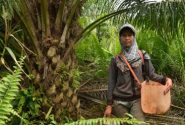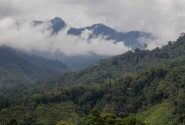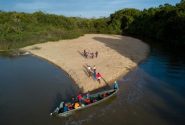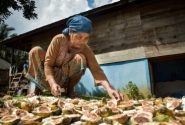
These illegal logs were harvested from a natural forest in Riau, Indonesia. Photo by Sofi Mardiah/CIFOR
BEIJING, China (9 November, 2011)_The fight to curb rampant illegal logging in the Asia Pacific region has come a long way in the past decade as strong market incentives to ship legal timber have emerged following dialogue between various stakeholders. However, governments need to deal with corruption which continues to impede efforts to ensure the sustainable supply of forest products.
“The core issue then, and it is still now, was corruption,” said Faith Doherty, Forest Team Leader in the Environment Investigation Agency (EIA) at the Asia Forest Partnership (AFP) Dialogue 2011 in Beijing yesterday.
Indonesia, for example, has largely failed to prosecute illegal loggers captured during law enforcement operations on the ground. “We don’t have control over the judicial system,” said Iman Santoso, Director General of Forest Utilization at the country’s Ministry of Forestry.
Corruption is largely an issue of capacity building, said Heidi Hiltunen, Environment Counselor at the EU Delegation in Beijing. Concerned organizations should assist civil servants and try to equip them with skills to fight against corruption, said Chen Yong, Deputy Director of the Center for International Forest Products Trade in the State Forest Administration of China. Simply sticking a label and blaming the governments “won’t serve any purpose,” he added.
The AFP discussion this year celebrates the 10th anniversary of a groundbreaking East Asian ministers meeting in Bali that created multi-stakeholder dialogues to facilitate the creation of policies which have noticeably curbed illegal logging and associated trade. In Indonesia, illegal logging has dropped by 75 percent since a peak in 2000, according to a report by Chatham House.
Efforts to make legal timber more attractive received a great boost by the signing of EU regulations to ban selling illegal timber in the region starting in March 2013. EU and Indonesia signed a Voluntary Partnership Agreement (VPA) – the first in Asia – earlier this year after four years of negotiations. Under this agreement, Indonesia has developed a national Timber Legality Verification System (SVLK) to trace the source of timber and their byproducts and certify them as legal.
The new EU regulation and a similar ban on illegal timber in the United States show that these buyers are taking responsibility in their roles in illegal logging, said Faith. EIA will monitor the implementation of the sales ban when the regulations come into force, she said.
The EU is in negotiations with Malaysia and Vietnam to form similar VPAs and may start talks with Thailand and Laos next year. Other countries that import timber, including Australia, are expected to follow suit in banning the sale of illegal timber, according to the European Forest Institute.
Legality is great, but is it enough?
The voluntary agreements that the EU seek to form with timber exporting nations are based on legislation, including the definition of legality, in the country of harvest, said Heidi. While commending the progress that’s been made, some participants in the AFP Dialogue questioned whether this was enough and what steps should be taken next.
Andrew Lang from World Bioenergy Association pointed out that ‘legal’ may not mean ‘sustainable’ nor ‘ethical’, as in the case of forest areas cleared for other industries, despite protests from local communities. Actions that aren’t against any prevailing laws may be unjust and bring conflict, said Charles Barber, vice chair of AFP’s steering committee. “A lot of the most terrible things in human history were perfectly legal.”
About three-quarters of Asian forests are involved in conflict, which is very closely linked to illegal logging, said Yurdi Yasmi from RECOFTC in a separate session. “This is because we have not been able to solve the (problem) of social injustice,” he said.
Aside from resolving these issues in the forestry sector, they also need to be addressed in other industries affecting forests, said a participant from Indonesia. “Now that we have defined legality in the timber (industry), maybe we can define legality in oil palm and coal” industries, he said.
The AFP Dialogue 2011 was held on 8-9 November 2011 in Beijing, China. It is a partner event of the second Asia Pacific Forestry Week (APFW) that is taking place from 7 to 11 November 2011 and has been organized by the Food and Agriculture Organization of the United Nations, the Asia-Pacific Network for Sustainable Forest Management and Rehabilitation (APFNet) and the State Forestry Administration of China.
For other reports from the event, visit the blogs of these organizations:
– Food and Agriculture Organization of the United Nations (FAO)
– The Center for People and Forests (RECOFTC)
We want you to share Forests News content, which is licensed under Creative Commons Attribution-NonCommercial-ShareAlike 4.0 International (CC BY-NC-SA 4.0). This means you are free to redistribute our material for non-commercial purposes. All we ask is that you give Forests News appropriate credit and link to the original Forests News content, indicate if changes were made, and distribute your contributions under the same Creative Commons license. You must notify Forests News if you repost, reprint or reuse our materials by contacting forestsnews@cifor-icraf.org.











